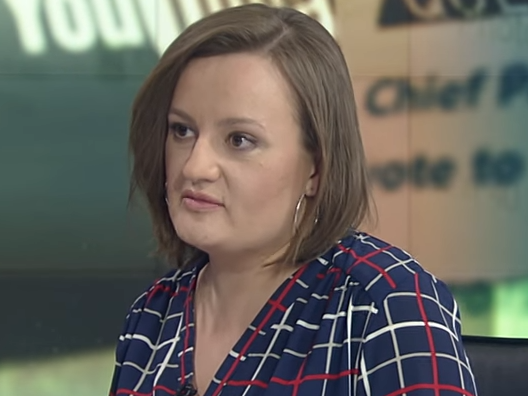
The deputy editor of RT (formerly Russia Today) has blamed politicians for the rise in so-called “fake news” and said it should be up to journalists to call out each other’s mistakes as a form of self-regulation.
Anna Belkina (pictured), also head of communications at the Kremlin-backed news organisation, laid the blame for an increase in disinformation and misinformation at the door of politicians like Boris Johnson.
“Unfortunately, and entirely misguidedly, a lot of the blame for fake news has been placed at the feet of alternative voices among legitimate news media, which is what we are,” she said.
Belkina was speaking at the Westminster Media Forum last month. A transcript of the event that could contain errors was released on Friday.
Shortly before the forum, Foreign Secretary Jeremy Hunt took aim at RT saying the channel “want their viewers to believe that truth is relative and the facts will always fit the Kremlin’s official narrative. Even when that narrative keeps changing”.
Belkina argued there is an “unfortunate misconception” that RT is a voice for the Kremlin, adding that it features a “rich diversity of voices ” if a comprehensive view is taken across the whole website.
She claimed that attempts to tackle fake news by the likes of governments and social media platforms are failing globally because of a “disproportionate focus” on media organisations rather than politicians, political entities and “shadowy rogue actors”, which she said were the “primary sources of false information”.
She pointed to the Conservative leadership candidate and former Foreign Secretary Johnson after press regulator the Independent Press and Standards Organisation ruled that he breached accuracy guidelines in his Daily Telegraph column when he claimed a no-deal Brexit was the preferred option for leaving the EU “by some margin”.
“This is just illustrative of the situation where the same politicians who complain about fake news and false information can be often its source,” Belkina said.
“And it is exactly the kind of misinformation that has a real impact on the public – just because of the high profile of where it’s coming from, the person or the organisation.”
Regulatory attempts have been misdirected at already highly-regulated media organisations rather than “the creators of the ‘real fakes’”, she said, while the term “fake news” is too often conflated with subjects or views that people or politicians don’t like.
“Fake news most often comes from politics, and it always has and it always will. While it might be comfortable for some to blame a foreign force, the problem is usually much closer to home,” Belkina said.
The “most important” tool at the disposal of journalists seeking to tackle fake news is the ability to call each other out on mistakes and inaccuracies as a form of self-regulation, she went on.
She echoed words from Twitter chief executive Jack Dorsey last year when he put the onus on journalists to “document, validate and refute” unsubstantiated rumours spread by the likes of US conspiracy theory website Infowars.
RT is subject to Ofcom’s Broadcasting Code in the UK, while most newspapers, magazines and online media are regulated by IPSO or alternative regulator Impress.
Belkina said: “Yes, we can, and do, scrutinise politicians at home and abroad, but I think that what is equally, if not more important, and what gets lost in this fight against misinformation, disinformation and fake news, is that we are in the position to call each other out on actual mistakes.
“Not in broad strokes, or labels, but on a case by case basis as journalists do with all stories. And we already do do that.
“What happens when we do get called out? Well, we might correct and apologise, where it’s called for on the basis of errors and actual facts, because after all, in a 24-hour news cycle, everybody makes an occasional mistake. But, it is this accountability that separates all legitimate news media and the Pizzagate pedalling factories.”
The so-called Pizzagate conspiracy theory falsely claimed a child sex ring involving Hilary Clinton operated out of a pizza restaurant in Washington DC. Infowars presenter Alex Jones was forced to apologise for promoting it.
Belkina continued: “Or, we might disagree, and move on, when it is a matter of diverging analysis and perspectives – avoiding the issue of censorship of anything that might be labelled as misinformation or disinformation by political actors.
“And, because for better and for worse, for now we all live on the same social media platforms, we can and do use them for this transparent rapid response and direct dialogue between ourselves and with our audience.
“As long as access to these platforms remains fair and equal to all accountable news actors, no matter where they’re from, how they’re funded or how different their voices, it is the best tool we have against false information.”
Picture: RT
Email pged@pressgazette.co.uk to point out mistakes, provide story tips or send in a letter for publication on our "Letters Page" blog
